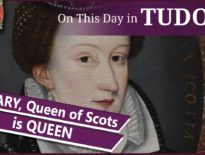On this day in Tudor history, 13th December 1558, civil lawyer and dean of Chester William Clyffe died.
Clyffe was one of the authors of the 1537 “Bishops' Book”, and he was consulted by convocation during Henry VIII’s Great Matter. He was thrown into prison for a time for refusing to do a favour for one of the king's servants - oh dear!
Find out more about William Clyffe's life and career in today's "on this day" talk.
Also on this day in Tudor history, 13th December 1577, pirate, sea captain, and explorer Sir Francis Drake finally left the port of Plymouth on his circumnavigation of the Globe. In last year’s video, I shared a wonderful letter written by Drake. You can hear it in last year’s video:
Also on this day:
- 1561 – Death of Lawrence Dalton, Richmond Herald, Rouge Croix Pursuivant and Norroy King of Arms. He was buried at St Dunstan-in-the-West, London.
Transcript:
On this day in Tudor history, 13th December 1558, civil lawyer and dean of Chester William Clyffe died.
Clyffe was one of the authors of the 1537 “Bishops' Book”, and he was consulted by convocation during Henry VIII’s Great Matter.
Let me tell you a bit more about William Clyffe…
• Nothing is known of Clyffe’s background and early life, but he graduated from Cambridge with a Bachelor of Law in 1514 and a doctorate in 1523.
• In 1522, he was admitted to the Doctors’ Commons as an advocate. The Doctors’ Commons, was a London society of civil lawyers.
• Between 1522 and 1529, Clyffe worked as a commissary of the diocese of London.
• In 1526, he was prebend of Twyford, in the diocese of St Paul, and in 1529 was made archdeacon of London. In 1532, he held the prebend of Fenton, in the archdiocese of York.
• In 1533, his expertise on marriage and divorce law led to convocation seeking his advice regarding Henry VIII’s case for an annulment of his marriage to Catherine of Aragon. He heard and determined a number of divorce cases during his career.
• 1533 was also a troubled year for Clyffe as Archbishop Cranmer’s vicar general in Ely complained that he was hindering him from administering justice, and later that year he was involved in litigation due to an accusation of him wrongfully interfering in a case in the court of chancery.
• In 1533, Clyffe resigned as archdeacon of London to become archdeacon of Cleveland. He also held the living of Waverton, Cheshire, in that year. In 1534 he was precentor of York, then served as treasurer of York in 1538 until the position was suppressed in 1547. At that point, he became dean of Chester and was subsequently thrown into the Fleet prison by the comptroller of the king’s household, Sir Richard Cotton, after he’d refused to lease Cotton chapter lands at a preferential rate. It took him changing his mind and leasing Cotton the lands to obtain freedom.
• In 1537, Clyffe was one of the authors of “The Godly and Pious Institution of a Christian Man”, more commonly known as the Bishops’ Book. This book was compiled by a committee of divines and bishops, and was an attempt to outline the religious doctrine of England following the 1536 Ten Articles.
• From 1548, he was prebend of Noxton in Middlesex, and in 1552, he held the living of Standish in Lancashire.
• William Clyffe died on this day in 1558.




Leave a Reply